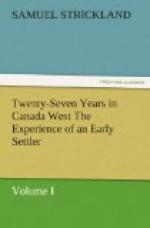On my return home, I found an official letter from the Adjutant-general of the Upper Canada Militia, in which I was informed I was appointed by his Excellency Sir P. Maitland to an Ensigncy in the first regiment of Durham Militia. The effective militia of this province is, I believe, about 150,000 men. All persons, from sixteen to sixty, must enrol their names once a year, and all from sixteen to forty, must muster for general training on the 28th of June in each year. The officers, in time of war, receive the same pay and allowances as those in the line.
The winters of 1825 and 1826 were considered cold, even for Canada. The sleighing was good from the middle of December to the middle of March, with the exception of the January thaw, which continued for upwards of a week, and took away nearly all the snow. This thaw, though periodical, is not every year of the same duration, nor does it always take away the snow. Sometimes it is attended by strong gales of wind, from the southward, and with heavy thunder and lightning, which was particularly the case last January. The month of February is generally considered the coldest of the winter months. I have frequently known the thermometer range from 16 degrees to 20 degrees below zero, for a week together. On one day of the winter of which I am speaking, it was as low as 35 degrees. This, however, is unusual.
The coldest day I ever remember was in the winter of 1833. It was called the “Cold Sunday.” The quicksilver in Fahrenheit’s thermometer was frozen in the ball, which marks 39 degrees below zero. It was, however, stated in the papers, both in Canada and the State of New York, that the real cold was 40 degrees below zero, or 72 degrees below freezing point. I dined at a friend’s that day, who resided three miles from my farm in Douro. The day was clear, not a cloud being above the horizon. The sun was of a dull copper-colour, and the horizon towards the north-west tinged with the same hue. Not a breath of wind was stirring. The smoke from the chimneys rose straight up into the air, and appeared unable to disperse through the atmosphere. My horses were as white as snow from the steam of their bodies freezing upon them; the reins were frozen as stiff as rods; the air seemed to cut like a knife. I was only a quarter of an hour upon the road, but even in that time I felt the cold severely, and was very glad when I got into the house to a large wood fire. The cold obliged the whole party at dinner to take their plates upon their knees and sit round the fire. But, as I said before, this is only an extreme case, and might not happen again for twenty years.
The excessive cold seldom lasts more than three days at a time, when it generally moderates, though not sufficiently to soften the snow. The dryness of the atmosphere and snow makes you feel the cold much less in proportion than in England. You do not experience that clinging, chilly, damp sort of cold in Canada that you do in the British Isles. For my part, I much prefer a Canadian winter, where the roads are good, the sleighing good, and your health good. Sickness is scarcely known here in the winter months.




